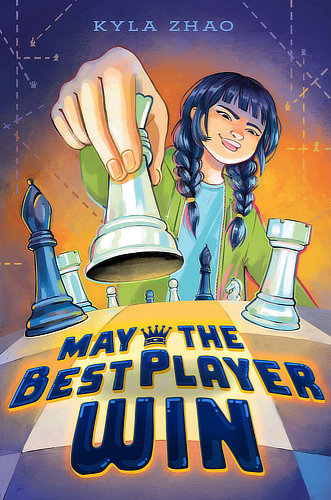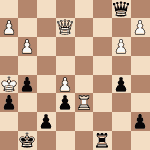In some situations, scoring the same number of points results in more awards for one player than for another. In 2024, a middle grade novel and a Texas Chess Association initiative enable such situations by giving awards limited to girls. Will awards just for boys follow, as they did in 1970s Nebraska?
Fiction: May the Best Player Win

In the middle grade novel May the Best Player Win, teammates May and Ralph each score 6 out of 8 points in a fictional “California Middle School State Chess Championship.” That score places them in the top 10 but outside of the first, second, and third place medals. Those medals go to players scoring 6.5 or more.
As May is leaving the venue, she learns that there is a new award for girls who perform exceptionally. May and her parents decide to attend the awards ceremony. May receives the award and an article about her is published in a national chess magazine. Her teammate Ralph gets nothing.
At first, May and her parents are excited by the recognition. But then May feels pressure to perform at chess, especially once her school features her in its fundraising campaign. Ralph is jealous and his friendship with May seems ruined. Author Kyla Zhao makes the reader care about these characters and wonder which one will lead their school’s chess team going forward. Will May quit chess because of the pressure? Will May and Ralph reconcile? Zhao answers those questions by the novel’s end.

G.P. Putnam’s Sons Books for Young Readers published May the Best Player Win. The book goes on sale September 17, 2024. It is for ages 8-12 and retails for $17.99. An excerpt and more information are available at this link.
Real Life: Texas Chess Association
At the September 1, 2024, Texas Chess Association (TCA) meeting, David Ortiz became President of TCA. Also at the meeting, his motion—about awards at tournaments run by TCA—passed. Here is the wording of his motion, which is also available at this link:
Awards for Top Girls in Sections at Tournaments
All participants in scholastic, junior and collegiate events who are listed as female in US Chess records shall be eligible for these awards. In all other events, participants who are under sixteen years of age and are listed as female in US Chess records shall be eligible.
The criteria for determining the top girls in each section shall be based on performance within their respective sections, considering factors such as number of wins, tiebreaks, and overall performance against their peers.
The awards may include but are not limited to trophies, certificates, or other forms of recognition deemed appropriate by the tournament organizers.
These awards shall be incorporated into the TCA bidding guidelines for future events, specifically applying to TCA events that have not been bid out.
Attendees discussed possible distributions of these awards. For example, a girl might score too few points to get an overall award (like May did in her state championship). In that case, a girl would get an award but a boy (like Ralph) with the same score would get nothing.
In a different scenario, a girl might win both the top overall award and the top girl award. Her two awards would differ, for example a trophy for her overall award and a water bottle or a chess book for her top girl award.
1970s Nebraska
In Ortiz’s motion, TCA does not restrict each winning girl to just one award, which was my experience in Nebraska. At the TCA meeting, I shared that experience, which I repeat in the following paragraph.
In 1975 and 1976, Angel Niedfeld and I took all the prizes in the Under Age 13 sections of Nebraska tournaments. In each tournament, I won the first-place trophy and Angel got the first girl trophy. I wasn’t given the option to have both trophies, as the rule was one trophy per player. Eventually, the parents of the boys complained. A new structure of first overall, first boy, and first girl trophies was established.
Likewise in 2024, girls can win the first-place overall trophies. Elizabeth Braddy won the high school championship section of the Oklahoma scholastic championship. IM Alice Lee is the top 14-year-old chess player in Minnesota. If Lee chose to compete in Minnesota’s scholastic championships, she would be favored to win state overall titles. Lee is also the third-best 14-year-old, of any gender, on a recent list published by US Chess. Texan WFM Rachael Li is the twelfth-best 14-year-old on that same US Chess list. Li would be a contender for Texas scholastic overall titles.
One reason that I voted against Ortiz’s motion is its cost. A report from TCA Scholastic Committee Chair Victor Flores stated, “Estimated additional costs for these awards are expected to be no more than $500 per event, depending on the number of eligible sections and the type of awards chosen.” TCA will offer awards for girls in multiple sections, such as sections limited to players under certain rating cutoffs. If Nebraska history is a guide, awards for girls might lead to even more expenses for TCA. Parents of Texas boys might demand gender-specific awards for their sons to win!
Smothered Mate
Although Zhao’s book doesn’t include any chess diagrams or chess notation, she describes chess games so that readers can visualize them. For example, Zhao writes about a smothered mate where May sacrifices her queen. If her opponent’s rook captures the queen, then May will checkmate. When I read that passage, I remembered playing a queen sacrifice leading to a smothered mate.
